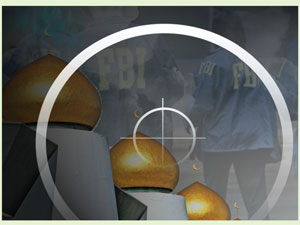/GIN

NEW YORK – The bitter controversy over the building of a Muslim community center and mosque near the site of the terrorist attacks in New York on September 11, 2001, is sparking new fears of government snooping on Islamic holy places–which it now claims it can do without a warrant.
The American Civil Liberties Union (ACLU), the Asian Law Caucus (ALC), and the San Francisco Bay Guardian newspaper, are suing the Federal Bureau of Investigation (FBI) in San Francisco over the agency’s failure to respond to a five-month-old request for information on its investigation of Bay Area Muslim groups.
The groups are seeking details of any surveillance the FBI has carried out since 2005 on area mosques and Islamic centers, as well as information on the recruitment of Muslim school children into the agency’s Junior Agent Program.
Julia Harumi Mass, staff attorney with the ACLU of Northern California, told IPS, “The FBI should focus its resources on targets for whom it has specific facts that support a reasonable suspicion of criminal activity, rather than using undercover informants to spy on people in their houses of worship.”
She added, “The lawsuit we have brought is one seeking records, so that we–and the public–can evaluate the FBI’s policies and practices to make sure they enhance national security without undermining our civil liberties. We have not sued for any misconduct other than failing to provide governmental records as required by law.”
But, according to the FBI itself, the agency needs no suspicion of wrongdoing before it initiates surveillance.
In a July 28 letter addressed to Senate Judiciary committee Democratic members Dick Durbin of Illinois and Chairman Patrick Leahy of Vermont–following the testimony of FBI director Robert Mueller–the agency said that suspicion of wrongdoing was not necessary to launch an investigation against an individual or organization.
“No particular factual predication is required” for the initiation of a preliminary investigation, according to the FBI’s operational guidelines.
“This is intelligence gathering run amok,” said Shahid Buttar, executive director of the Bill of Rights Defense Committee. “The FBI is saying it can initiate surveillance without a reason.”
“This is a dragnet way of uncovering information and a dramatic step backwards in the history of civil rights,” he charged.
The basis of the FBI’s contention is unclear. The Fourth Amendment to the U.S. Constitution, part of the Bill of Rights, guards against unreasonable searches and seizures. It specifically requires search and arrest warrants be judicially sanctioned and supported by probable cause.
The ACLU of Northern California made its initial request for records under the Freedom of Information Act (FOIA) in March, according to their complaint. The plaintiffs hope to persuade the court to force the FBI to process their FOIA request and release the records immediately.
The plaintiffs first sought out the FBI records after area Muslims contacted the ACLU and the Asian Law Caucus with concerns that the Bureau was scrutinizing their activities and attempting to recruit “informants and infiltrators,” according to the ALC. In a statement, the group said the FBI had failed to produce its records despite admitting in March that media attention on the investigation of Muslim groups entitled his clients to expedited processing of their FOIA request.
In 2009, it was revealed that the FBI used paid informants and agent provocateurs in U.S. mosques. The Muslim American community says this news sends a devastating message to community leaders and imams who have worked diligently to foster greater understanding between law enforcement and their communities.
Related news:
ACLU challenges secret spying law (FCN, 04-27-2010)
Nation of Islam Targeted by Homeland Security (FCN, 12-24-2009)
The FBI, the Muslims and the double-cross (FCN, 04-22-2009)
Cointelpro 2009: FBI up to old dirty tricks? (FCN, 12-18-2009)












